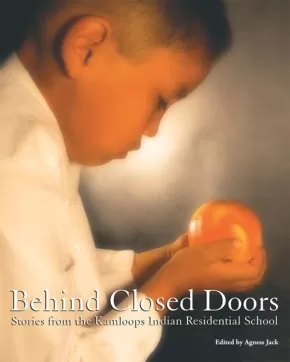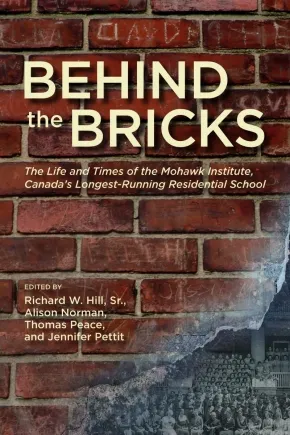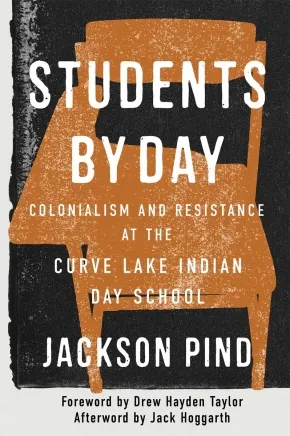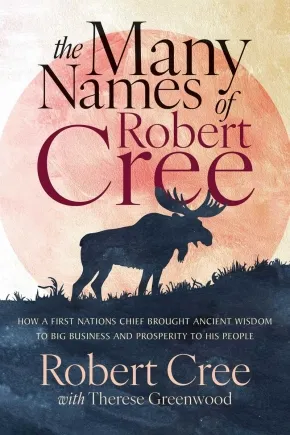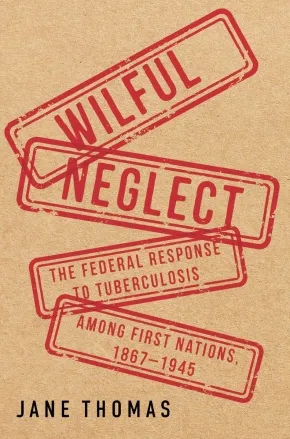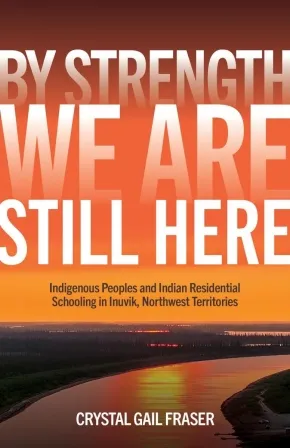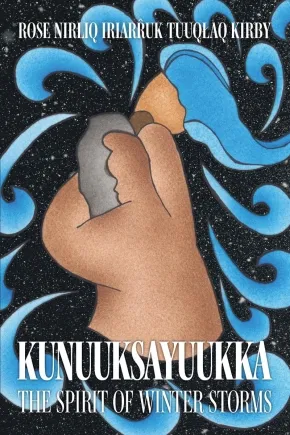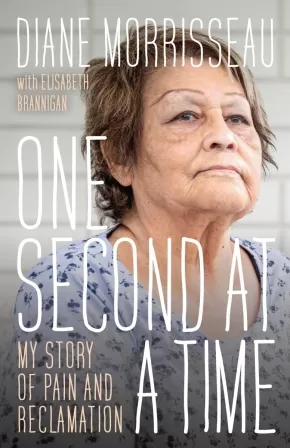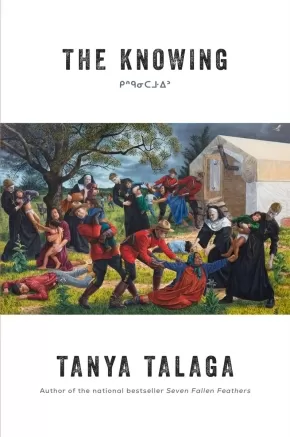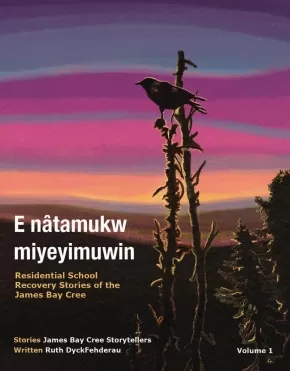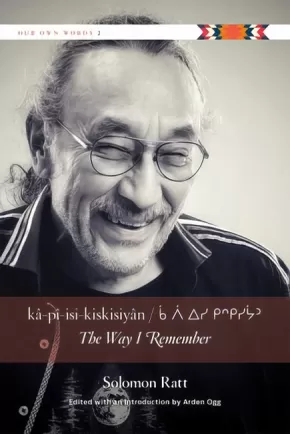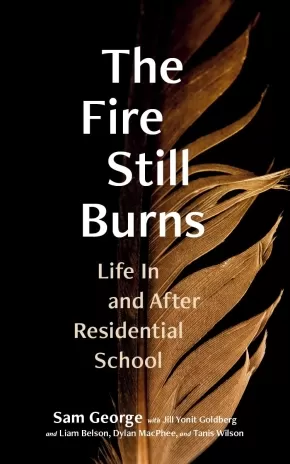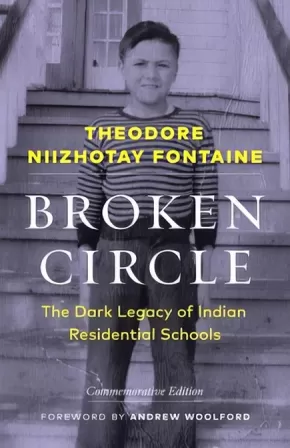Residential Schools
Synopsis:
Behind Closed Doors features written testimonials from thirty-two individuals who attended the Kamloops Indian Residential School. The school was one of many infamous residential schools that operated from 1893 to 1979. These storytellers give voice to the thousands as they remember and share with us their stolen time at the school; many stories are told through courageous tears.
Additional Information
202 pages | 11.50" x 8.00" | Paperback
Synopsis:
Behind the Bricks is the story of the Mohawk Institute, Canada’s first and longest-running residential school and a model for the entire residential school system.
From the outside, the Mohawk Institute looks like a large and welcoming school building. When one looks behind the bricks of the school, however, a much different story becomes apparent. Conceived and overseen by Six Nations community member Richard W. Hill Sr., Behind the Bricks is an important work that provides deep insight into the Mohawk Institute, Canada's first, and longest-running, residential school, operating from 1828 to 1970 in Brantford, Ontario. Many see the Mohawk Institute as a model for the residential school system.
Behind the Bricks brings together Indigenous and non-Indigenous experts. The book begins with an overview that traces the history and context of the school, and the remainder of Behind the Bricks touches on a broad array of topics from the experiences of students, to archaeology and architecture, to the role of religion, and beyond, drawing on a wide variety of sources including government documents, church records, and oral history.
Behind the Bricks examines the policies and motivations that shaped the experiences of all three parties involved with the school, the government, the church, and the students and their communities.
A thorough and thoughtful history that provides deep insight into over a century of institutional operation, Behind the Bricks is an essential work that tells us not only about the Mohawk Institute, but the entire residential school system, providing a window into the past with the goal of working towards a future of truth and reconciliation.
With contributions by: William (Bill) Acres, Diana Castillo, Sarah Clarke, Jimmie Edgar, Wendy L. Fletcher, Bonnie Freeman, Tara Froman, Alexandra Giancarlo, Cody Groat, Evan J. Habkirk, Richard W. Hill Sr., Keith Jamieson, Sandra Juutilainen, Magdalena Miłosz, David Monture, Teri Morrow, John Moses, Alison Norman, Thomas Peace, Jennifer Pettit, Paul Racher, and Bud Whiteye.
Reviews
"As we continue to reckon with the legacy of colonial schooling, this timely collection helps to model how to put truth before reconciliation." — Sean Carleton, University of Manitoba
Educator Information
Table of Contents
Preface
Richard W. Hill, Sr.
Introduction
Jennifer Pettit
The Russ Moses Residential School Memoir
John Moses and Russ Moses
Part One: Historical Overview and Context of the Mohawk Institute
1. “To Shake Off the Rude Habits of Savage Life”: The Foundations of the Mohawk Institute to the Early 1900s
Jennifer Pettit
2. “The Difficulties of Making an Indian into a White Man Were Not Thoroughly Appreciated”: The Mohawk Institute, 1904 to Present
Jennifer Pettit
Part Two: Teachers, Curriculum, and Tools of Control
3. The Indian Normal School: The Role of the Mohawk Institute in the Training of Indigenous Teachers in the Late 19th Century
Alison Norman
4. Teaching Control and Service: The Use of Military Training at the Mohawk Institute
Evan Habkirk
5. “New Weapons”: Race, Indigeneity, and Intelligence Testing a thte Mohawk Institute, 1920-1949
Alexandra Giancarlo
Part Three: The Building, The Grounds, and Commemoration
6. A “Model” School: An Architectural History of the Mohawk Institute
Magdalena Miłosz
7. The Stewardship, Preservation, and Commemoration of the Mohawk Institute
Cody Groat
Part Four: Survival and Resistance
8. Ten Years of Student Resistance at the Mohawk Institute, 1903-1913
Diana Casillo
9. ęhǫwadihsadǫ ne:ˀhniˀ adigyenǫ:gyeˀs ganahaǫgwęˀ ęyagǫnhehgǫhǫ:k/They buried them, but they the seeds floated around what will sustain them.
Teri Lyn Morrow, Bonnie Freeman, and Sandra Juutilainen
Part Five: The New England Company and the Mohawk Institute
10. A Model to Follow?: The Sussex Vale Indian School
Thomas Peace
11. Robert Ashton, The New England Company, and the Mohawk Institute, 1872-1910
Bill Acres
12. The Lands of the Mohawk Institute: Robert Ashton and the Demise of the New England Company’s “Station,” 1891-1922
Bill Acres
Part Six: Student Experiences and Voices
13. Life at the Mohawk Institute During the 1860s
Thomas Peace
14. Collecting the Evidence: Restoration and Archaeology at the Mohawk Institute
Sarah Clarke, Paul Racher, and Tara Froman
15. Collective Trauma and the Role of Religion in the Mohawk Institute Experience
Wendy Fletcher
16. Concluding Voices – Survivor Stories of Life Behind the Bricks
Richard W. Hill, Sr.
Closing Poems
Jimmie Edgar
Bud Whiteye
David Monture
Acknowledgements
Appendix One: History of Six Nations Education by Jamieson
Keith Jamieson
Appendix Two: Mohawk Institute Students Who Became Teachers
Suggested Reading
Additional Information
402 pages | 6.00" x 9.00" | 89 Illustrations | Paperback
Synopsis:
From veteran hockey reporter Patrick Johnston and Gino’s longtime friend Peter Leech comes the authorized biography of Gino Odjick.
In the 1980s and ’90s, National Hockey League games were very different from the nimble, skill-focused displays we see today. One of the greatest differences—and one of the sport’s more popular facets at the time—was the widespread presence of “enforcers”: hulking, battle-scarred players whose main task was to police the sport by chasing down and brawling with opponents who had broken unwritten codes determining which aspects of violence counted as dishonorable or unjustified.
When hard-hitting Vancouver Canucks player Gino Odjick emerged in the early 1990s, he quickly became one of the game’s most feared enforcers and revered teammates, a sign of a new era for the team, racking up 296 penalty minutes in the 45 games he played in his rookie season. Hailing from Kitigan Zibi, an Algonquin community near Maniwaki, Quebec, Gino was one of the few Indigenous players in the NHL at the time. But it was Gino’s ferocious play contrasted by his genuinely affable and openhearted personality off the ice that won him a special place in the hearts of Canucks supporters.
Yet legends often obscure the human stories behind them. Patrick Johnston and Peter Leech look beyond Gino’s legendary persona, drawing on insights from family members, friends, and teammates to recount Gino’s early years in a loving household that was always ready to welcome foster children. Gino’s father, Joe, had suffered the lonely traumas of the residential school system, and the experience had instilled a commitment in the family to those who were less fortunate.
The book also details Gino’s eventual struggles with alcohol abuse, and how he responded by taking on the role of empathetic mentor to young Indigenous people, travelling from community to community to hear their stories and offer hope. He never wavered in this role, even as he confronted serious illnesses, including chronic traumatic encephalopathy (CTE) and the rare blood disorder that he survived for years longer than expected, but that eventually led to his death at age fifty-two.
Gino is a moving tribute to a beloved hockey legend.
Reviews
"Gino was the greatest teammate; he had such a huge heart and knew his role better than anyone in the league. Gino loved being a Vancouver Canuck and gave back to the community in so many ways. He will be greatly missed by his family, friends, and fans. This book will give people insight into his remarkable life."—Geoff Courtnall
“Gino provides a compelling account of the life of a beloved Vancouver Canuck. From his humble beginnings in Quebec to NHL stardom and beyond, Odjick was dedicated to the well-being of teammates and the Indigenous community. This is an excellent tribute to an exceptional man.”—Randi Druzin, author of Between the Pipes and Behind the Mask
Additional Information
288 pages | 6.00" x 9.00" | b&w insert | Hardcover
Synopsis:
Offering readers a unique history of an Indian Day School and a profile of Anishinaabe resilience.
The atrocities of the residential school system in Canada are amply documented. Less well-known is the history of day schools, which some two hundred thousand Indigenous youth attended.
The Curve Lake Indian Day School operated for over ninety years, from 1899 to 1978. Implementing Indigenous community research practices, Jackson Pind, alongside the Chief and Council of Curve Lake First Nation, conducted a search of the federal archive on operations at the school. Students by Day presents the findings, revealing that the government failed in its fiduciary duty to protect students. Harmful and discriminatory policies forced children to abandon their language and culture and left them subject to many types of abuse. To supplement this documentation, Pind also interviewed survivors of the school, who shared their often difficult testimony. He situates Curve Lake’s development and operations within the wider context of Canadian assimilation policies, noting the lasting impacts on Anishinaabe identity and culture.
Not only recovering the archive, written and oral, but building on files repatriated to the community, Students by Day is a story of Indigenous resilience, activism, and hope in the face of educational injustice.
Reviews
“An incredible achievement. Students by Day is innovative and collaborative, pushing Indigenous historical research forward in ways that will offer real, tangible improvements to communities and individuals.” - Lianne C. Leddy, author of Serpent River Resurgence: Confronting Uranium Mining at Elliot Lake
“Students by Day is an intricate uncovering of day schools’ history, navigating archives and life stories. It sets a gold standard for community-centred research, reminding us of the centrality of love to culture, people, and politics.” - Niigaan Sinclair, author of Wînipêk: Visions of Canada from an Indigenous Centre
“With care, clarity, and accountability, Jackson Pind’s book listens to Curve Lake First Nation and honours survivors’ experiences. Students by Day is not only powerful history; it’s a model for community-based research that serves Indigenous resurgence.” - Crystal Gail Fraser, author of By Strength, We Are Still Here: Indigenous Peoples and Indian Residential Schooling in Inuvik, Northwest Territories
Educator Information
Table of Contents
Figures vii
Foreword: Day Schools xi
Drew Hayden Taylor
Acknowledgments xv
1 Introduction to Place: Growing Up in Michi Saagiig Anishinaabeg Territory 3
2 Researching Indian Day Schools in Canada 15
3 The New England Company and the Creation of the Indian Day School 30
4 Mismanagement and Mistrust: The Methodist Missionary School in Curve Lake 45
5 A Legacy of Neglect: The United Church of Canada’s Indian Day School 86
6 Beyond the Classroom: Educational Philosophies and Opportunities 122
7 Experiencing Indian Day School: Education and Integration 150
8 A Class in Resistance: Curve Lake First Nation’s Fight for Education 173
Afterword 197
Jack Hoggarth
Appendix: Letter of Support from Curve Lake First Nation 201
Notes 203
Index 255
Additional Information
256 pages | 6.00" x 9.00" | 9 photos, 5 drawings | Hardcover
Synopsis:
A vital account of the life and many names of Robert Cree, and his plan for a peaceful, sincere, and just path to reconciliation in an angry and chaotic world.
His mother called him “Bobby Mountain.” Elders called him “Great Man.” His people called him “Chief.” Oil men called him “Mr. Cree.” But the government called him “Number 53.” Robert Cree was all of these while facing his people’s oppressors and freeing the ghosts of tortured spirits.
The Many Names of Robert Cree is his first-person account of survival in a brutally racist residential school system designed to erase traditional Indigenous culture, language, and knowledge. It is also the story of an epic life of struggle and healing, as Cree takes the wisdom of his ancestors and a message of reconciliation to the halls of government and to industry boardrooms.
In the storytelling tradition of his people, Cree recounts his early years in the bush, his captivity at a residential school, his struggles with addiction, his political awakening as one of Canada’s youngest First Nation Chiefs, and the rising Indigenous activism of the late 20th and early 21st centuries. He also recounts the oil industry’s arrival on his poverty-stricken reserve and the ensuing struggle to balance economic opportunity with environmental challenges.
Throughout, Cree’s leadership is rooted in his unshakable commitment to the sacred traditional teachings of his people. His beliefs give him the strength to focus on hope, dignity, and building a better future for his community. Now a respected Elder and spiritual leader, Cree champions forgiveness as a powerful force that can bring healing and transformation for all.
Additional Information
264 pages | 6" x 9" | Paperback
Synopsis:
How colonial medical policies are linked to health inequities that persist in First Nations a century later.
Tuberculosis, once a leading cause of death in Europe and North America, was understood to be preventable and even curable by the early twentieth century. Yet despite growing knowledge about the disease and interventions that would slow its spread, tuberculosis deaths among First Nations in Canada remained staggeringly high. Government policies rooted in colonialism exacerbated a tuberculosis epidemic. Wilful Neglect explores the devastating consequences of the Department of Indian Affairs’ failed responses to tuberculosis among First Nations in Canada from 1867 to 1945. Even when medical treatment for tuberculosis became widely available, and despite the codification of the federal government’s obligations in treaties and other legislation, the basic health needs of First Nations remained unmet. The government instead prioritized an assimilationist agenda, including the placement of Indigenous children in residential schools, which became hotbeds for the spread of the infection. Drawing on the department’s own annual reports, memoranda, and budgets over more than seventy years, Jane Thomas traces key moments, decisions, and individuals involved in shaping federal health policy, laying bare the repercusions of racializing a disease. Health policies developed by colonial governments without the involvement of First Nations have always failed. Wilful Neglect demonstrates a direct link between the federal government’s historical health policies and the disparities that continue into the present.
Reviews
“Wilful Neglect is a compelling national case study of the federal government’s complicity in the deaths of thousands of First Nations individuals during the tuberculosis epidemics of the nineteenth and twentieth centuries.” - Hugh Shewell, Carleton University
Educator Information
Table of Contents
Figures and Table • ix
Foreword • xi
Shawn Batise
Acknowledgments • xv
Abbreviations • xxi
Introduction • 3
1 “The promises we have to make to you are not for today only but for tomorrow”: Setting Precedent Through Legislation, Treaties, and Government Practice, 1867–1883 • 25
2 “There is a ready compliance on their part with regulations”: Assimilation at All Costs Through Civilizing, Christianizing, and Sanitizing the Infected, 1884–1903 • 47
3 “We are giving the best attention we can to the medical needs of the Indians”: Dr Peter Bryce’s anti-TB Crusade, 1904–1913 • 70
4 “We have been trying to get off rather cheaply”: Treatment of “Indian Tuberculosis,” 1914–1928 • 109
5 “The activities of the medical branch cannot fairly be judged by the visible results”: Vaccine Trials, Pilot Projects, and a New Medical Services Branch, 1929–1937 • 139
6 “A comprehensive and progressive program is long overdue”: New Funding and Treatment Facilities, 1938–1945 • 172
Conclusion: If Preventable, Why Not Prevented? • 193
Afterword • 199
Appendix A: Individuals Responsible for the Department of Indian Affairs (1867–1945) • 202
Appendix B: Department of Indian Affairs Medical Expenses (1868–1904) • 206
Appendix C: Timeline of United Church Mission Hospitals Opened in Canada • 208
Appendix D: Canadian Tuberculosis Association Expenses (1902–1945) • 210
Appendix E: Department of Indian Affairs Medical Expenses (1905–1945) • 212
Notes • 217
Bibliography • 271
Index • 289
Additional Information
318 pages | 6" x 9" | Paperback
Synopsis:
The first comprehensive study of Indian residential schools in the North.
In this ground-breaking book, Crystal Gail Fraser draws on Dinjii Zhuh (Gwich'in) concepts of individual and collective strength to illuminate student experiences in northern residential schools, revealing the many ways Indigenous communities resisted the institutionalization of their children.
After 1945, federal bureaucrats and politicians increasingly sought to assimilate Indigenous northerners--who had remained comparatively outside of their control--into broader Canadian society through policies that were designed to destroy Indigenous ways of life. Foremost among these was an aggressive new schooling policy that mandated the construction of Grollier and Stringer Halls: massive residential schools that opened in Inuvik in 1959, eleven years after a special joint committee of the House of Commons and the Senate recommended that all residential schools in Canada be closed.
By Strength, We Are Still Here shares the lived experiences of Indigenous northerners from 1959 until 1982, when the territorial government published a comprehensive plan for educational reform. Led by Survivor testimony, Fraser shows the roles both students and their families played in disrupting state agendas, including questioning and changing the system to protect their cultures and communities.
Centring the expertise of Knowledge Keepers, By Strength, We Are Still Here makes a crucial contribution to Indigenous research methodologies and to understandings of Canadian and Indigenous histories during the second half of the twentieth century.
Reviews
"By Strength, We Are Still Here demonstrates an intergenerational process of love and strength. Fraser's methodology, theory work, and incredibly thorough research are in and of themselves lifegiving, vital, and serve as an example to all other scholars." — Omeasoo Wahpasiw
"By integrating survivor testimony with archives, Fraser points towards the Indigenous resistance revealed in the ellipses and gaps in the colonial record. This is very important work." — Chris Trott
Educator Information
Table of Contents
Glossary
A Note on Region and Terminology
Introduction—By Strength, We Are Still Here.
Chapter One—“If anyone is going to jail for this, I’m taking it”: Our Relatives Speak
- Education in Nanhkak Thak Before the Arrival of Settlers
- Indian Day and Residential Schools
- The Construction of Inuvik
Chapter Two—Calls Grow. “Listen! It’s louder now. From here, from there. Indian voices, Métis voices, demanding attention, demanding equality!"
Chapter Three—“The long process of tearing our family apart”
Chapter Four—“Making us into nice white kids.”
Chapter Five—“The hazards that can result from too permissive or undisciplined sexual behaviour.”
Chapter Six—“To find that inner peace, it was so important for us all.”
Chapter Seven—“These are our children and they are very precious to us.”
Conclusion—“We knew the value of strength.”
Appendix A
Endnotes
Additional Information
320 pages | 6.00" x 9.00" | 69 b&w illustrations, index, bibliography | Paperback
Synopsis:
Kunuuksayuukka: The Spirit of Winter Storms is a story of Inuvialuk (Western Arctic Inuk) Elder Rose Kirby's early life, beginning from her vibrant traditional life on the land, to being taken away on a "ship of tears" to residential school in Aktlarvik (Aklavik), before moving around different DEW Line sites following her father Joseph Saraana Thrasher's work. Known for her powerful memory and storytelling skills, Rose vividly recounts stories from her childhood and even infancy.
Kunuuksayuukka: The Spirit of Winter Storms honours the important lessons that Rose has learned from her Elders and family, through watching how they interacted with one another, as well as with the larger natural world. Rose uses Kunuuksayuukka-the spirit of winter storms-and its slow disappearance from her life, to describe her own transition from traditional, nomadic life on the land to moving into housing settlements created by tan'ngit (white people).
Through almost 300 pages, Rose's book weaves through candid stories of human relationships, loss, love and care for one another, humour, pain, strength, and resilience. Most importantly, it is a heartfelt tribute to Inuvialuit culture, language, history, life, and experiences-all through the eyes of an Inuvialuk who has learned to move with the changing world as she grew up. This book is a must-read for anyone who wants to learn about how Inuvialuit lived long ago.
Additional Information
6.00" x 9.00" | 25 b&w photographs | Paperback
Synopsis:
Bullied and abused at the Fort Alexander Indian Residential day school, Diane Morrisseau fought back and left school at the age of fifteen. Despite her strength, a childhood of trauma and abuse led her into the arms of Edgar Olson, and by sixteen, the young Ojibway-Anishinabe woman had given birth to her first child and married the man who would become her tormentor for the next eighteen years.
For almost two decades, Diane Morrisseau was chained to a brutal husband who abused not only her, but their children. By threatening Diane with their death and hers should she ever try to leave, he ensured that she would continue to endure his cruelty. Notoriously violent, her abuser was aided and abetted by the systems of colonialism that failed to protect Diane during her childhood. Edgar was able to keep Diane and her children trapped in a cycle of violence for years, without being held accountable by law or society.
Despite this, Diane found the strength to walk away. This book is the story of how she did so, and how she rebuilt a life beyond her abuser. Through Al-Anon, Anishinabe traditional healing ceremonies, counselling, and care for others, Diane found a new path illuminated by compassion and purpose.
Diane Morrisseau recounts her traumatic history with one aim: to help other victims of violence know they are not alone, and that escape is possible. The author’s entire career, and this book, testify to her desire to extend to others the hope that eluded her in the depths of her desperate circumstances.
Devastatingly frank about the abuse she suffered, the mothering her children missed because of it, and the systems that allowed it all to happen, Diane today has reconciled the past with a present where she continues to live out the values that matter to her most.
All royalties from sales of this book will be donated to Archway Community Services.
The story of an Ojibway-Anishinabe woman who, against incredible odds, rescued herself and her children from a life of brutal beatings, sexual servitude, and almost unimaginable hardship.
Reviews
"Selected as one of the most anticipated feminist books of 2024."— Ms. Magazine
"A courageous and harrowing story. Morrisseau uses her painful personal journey to frame the horrific history of residential schools. Evocative and illuminating."
— Angela Sterritt, author of Unbroken: My Fight for Survival, Hope, and Justice for Indigenous Women and Girls
"I is, in many ways, a difficult story to read – but it is one that needs to be told. Readers will learn about a courageous woman and the circumstances that enabled an abusive relationship, and hear her message for how to recognize the situation and take steps toward a better life."— Don McCaskill, co-author of In the Words of the Elders
"A fervent call to action, an impassioned plea for compassion and empathy, and a formidable rallying cry that seeks to instigate transformation [… One Second at a Time] serves as a bridge, seeking to connect human souls through shared understanding and collective responsibility."— From the foreword by Marlyn Bennett
"Raw and brutally honest. Morrisseau bravely shares the details of her life with a violent man. Validating and inspiring, her story affirms the complicated healing journey of abuse survivors. It’s a must read for anyone working in the field of gender-based violence."— Kendra Nixon, director of Research and Education for Solutions to Violence and Abuse (RESOLVE)
"Diane Morrisseau has taken us into her confidence with her story, allowing us to truly understand as a society how the relationship between Indigenous people and settlers has created immense hardships for Indigenous people, families, and communities."— Marion Maar, professor, Northern Ontario School of Medicine University
Educator Information
All royalties from sales of this book will be donated to Archway Community Services.
Table of Contents
Foreword: A Tapestry of Truths / Marlyn Bennett
Preface
Prologue
A Note on the Text
1 A Perfect Home
2 Day School
3 Posting of the Bands
4 Mrs. Olson
5 Holes in the Walls
6 Breakdown
7 Scars
8 Breaking Free
9 Seeing the Trees
10 Freedom at Last
Acknowledgments
About the Authors
Additional Information
198 pages | 5.50" x 8.50" | Paperback
Synopsis:
From Tanya Talaga, the critically acclaimed and award-winning author of Seven Fallen Feathers, comes a riveting exploration of her family’s story and a retelling of the history of the country we now call Canada
For generations, Indigenous People have known that their family members disappeared, many of them after being sent to residential schools, “Indian hospitals” and asylums through a coordinated system designed to destroy who the First Nations, Métis and Inuit people are. This is one of Canada’s greatest open secrets, an unhealed wound that until recently lay hidden by shame and abandonment.
The Knowing is the unfolding of Canadian history unlike anything we have ever read before. Award-winning and bestselling Anishinaabe author Tanya Talaga retells the history of this country as only she can—through an Indigenous lens, beginning with the life of her great-great grandmother Annie Carpenter and her family as they experienced decades of government- and Church-sanctioned enfranchisement and genocide.
Deeply personal and meticulously researched, The Knowing is a seminal unravelling of the centuries-long oppression of Indigenous People that continues to reverberate in these communities today.
Additional Information
480 pages | 6.12" x 9.25" | Hardcover
Synopsis:
In this quietly powerful and deeply human book, Ruth DyckFehderau and twenty-one James Bay Cree storytellers put a face to Canada’s Indian Residential School cultural genocide.
Through intimate personal stories of trauma, loss, recovery, and joy, they tell of experiences in the residential schools themselves, in the homes when the children were taken, and on the territory after survivors returned and worked to recover from their experiences and to live with dignity. The prose is clear and accessible, the stories remarkably individual, the detail vivid but not sensational.
Together they reveal the astonishing courage and strength of children along with the complexity and myriad methods of their oppressors. A tough, often funny, and ultimately uplifting book that’s not quite like anything else out there.
This book is published by Cree Board of Health and Social Services of James Bay and distributed by WLU Press.
Reviews
“These previously unwritten stories of lived, traumatized experiences are testament to the storytellers’ courage and strength and resilience. When the rich Cree traditional and spiritual relationship with land and with family is harmed by separation, hatred, and fear - a harm resulting in anger and loss of values, identity, and self-worth - these storytellers find ways to heal. Through their stories, you learn about culture as treatment, about the power of forgiveness and love, and about peaceful co-existence in community as essential to healing, belief, and advancing true reconciliation.” —Chief Willie Littlechild, Ermineskin Cree Nation, Former Truth and Reconciliation Commissioner, Former residential school student athlete, Order of Canada; Order of Sport, Member of Sports Halls of Fame, Canada and North America
“These Cree stories, told with utmost respect and a feeling of safety, are gifts. They are medicine.” —Joanna Campiou, Woodland/Plains Cree Knowledge Keeper
“This is a difficult but necessary book. There’s a power to truth and to the realities of the Indian Residential School system, but for those wanting to see strength and movement toward hope, this is the book for you. These stories hold that hope close to the heart. What shines through is a love of the land, a love of community, a love of the Cree language, a love of family – exactly what colonial forces like the IRS system tried to destroy but couldn’t.” —Conor Kerr, Metis/Ukrainian author, Avenue of Champions, Giller Prize longlist
Additional Information
320 pages | 7.00" x 9.00" | Paperback
Synopsis:
A residential school survivor finds his way back to his language and culture through his family’s traditional stories.
When reflecting on forces that have shaped his life, Solomon Ratt says his education was interrupted by his schooling. Torn from his family at the age of six, Ratt was placed into the residential school system—a harsh, institutional world, operated in a language he could not yet understand, far from the love and comfort of home and family. In kâ-pî-isi-kiskisiyân / The Way I Remember, Ratt reflects on these memories and the life-long challenges he endured through his telling of âcimisowin—autobiographical stories—and also traditional tales.
Written over the course of several decades, Ratt describes his life before, during, and after residential school. In many ways, these stories reflect the experience of thousands of other Indigenous children across Canada, but Ratt’s stories also stand apart in a significant way: he managed to retain his mother language of Cree by returning home to his parents each summer despite the destruction wrought by colonialism.
Ratt then shifts from the âcimisowina (personal, autobiographical stories) to âcathôhkîwina, (sacred stories) the more formal and commonly recognized style of traditional Cree literature, to illustrate how, in a world uninterrupted by colonialism and its agenda of genocide, these traditional stories would have formed the winter curriculum of a Cree child’s education.
Presented in Cree Th-dialect Standard Roman Orthography, syllabics, and English, Ratt’s reminiscences of residential school escapades almost always end with a close call and a smile. Even when his memories are dark, Ratt’s particularly Cree sense of humour shines, making kâ-pî-isi-kiskisiyân /The Way I Remember an important and unique memoir that emphasizes and celebrates Solomon Ratt’s perseverance and life after residential school.
Reviews
"Sol is an international treasure the whole world should enjoy." —Buffy Sainte-Marie
"The Way I Remember is inarguably the most important book yet to be published for the preservation of the Cree language and an understanding of the importance of the oral tradition to Cree culture and education." —Jesse Archibald-Barber, First Nations University of Canada
"As he looks back over his life journey reclaiming, breathing new and old life back into our beautiful language, Solomon credits the late Reverend Edward Ahenekew for helping me "to put the pieces together." kista meena dear Solomon, ekosi aytotumawiyak. This is an important book because you have also put pieces together for us so that we can have a good journey. Kinahnaskomtin." —Maria Campbell, author of Halfbreed
"A gift to future generations...Full of humour and resilience in equal measure, these Cree/English stories offer us a glimpse into a world as it was, and future that could be" —Chelsea Vowel, author of Indigenous Writes
Educator & Series Information
Presented in Cree Th-dialect Standard Roman Orthography, syllabics, and English.
This book is part of the Our Own Words series.
Additional Information
264 pages | 6.00" x 9.00" | Paperback
Synopsis:
“My name is Sam George. In spite of everything that happened to me, by the grace of the Creator, I have lived to be an Elder.”
The crimes carried out at St. Paul’s Indian Residential School in North Vancouver scarred untold numbers of Indigenous children and families across generations. Sam George was one of these children. This candid account follows Sam from his idyllic childhood growing up on the Eslhá7an (Mission) reserve to St. Paul’s, where he weathered physical, emotional, and sexual abuse. He spent much of his life navigating the effects of this trauma – prison, addiction, and challenging relationships – until he found the strength to face his past. Now an Elder and educator with the Indian Residential School Survivors Society, this is Sam’s harrowing story, in his own words. An ember of Sam’s spirit always burned within him, and even in the darkest of places he retained his humour and dignity.
The Fire Still Burns is an unflinching look at the horrors of a childhood in the Indian Residential School system and the long-term effects on survivors. It illustrates the healing power of one’s culture and the resilience that allows an individual to rebuild a life and a future.
This frank and powerful personal story of trauma and resilience will bring a greater understanding to all readers – Indigenous and non-Indigenous alike – of residential schools and the impact they had on those who were forced to attend them.
Reviews
"I am glad that Sam George has lent his voice to the many voices of survivors now surfacing from residential "schools". I love the way Sam describes his traditional life before he was forced to go to the school and then later goes back to his culture to overcome the trauma he endured. Sam did time in jail for a crime he committed, but the real crime is that our Indigenous way of life was interfered with, and that created the dysfunction in our communities. This book shows that we had it right all along – Indigenous culture is our saviour."— Bev Sellars, author of They Called Me Number One: Secrets and Survival at an Indian Residential School
"Brutally frank yet disarmingly subtle, sensitive, and funny, The Fire Still Burns by Sam George offers an unflinching look at the human dimensions of Canada’s attempted genocide of Indigenous Peoples through residential schooling." — Sam McKegney, author of Carrying the Burden of Peace: Reimagining Indigenous Masculinities through Story
Educator Information
Table of Contents
Preface / Sam George
Acknowledgments
A Note on the Text
1 Your Name Is T'seatsultux
2 In Them Days
3 Our Lives Signed Away
4 The Strap
5 A Girl Named Pearl, a Boy Named Charlie
6 Runaway
7 I Tried to Be Invisible
8 Finding Ways to Feel Good
9 On Our Own
10 Oakalla
11 Haney Correctional
12 Longshoreman
13 Misery Loves Company
14 Drowning
15 Tsow-Tun Le Lum
16 I’m Still Here
Afterword: On Co-Writing Sam George’s Memoir / Jill Yonit Goldberg
Reader’s Guide
About the Authors
Additional Information
152 pages | 5.00" x 8.00" | Paperback
Synopsis:
A new commemorative edition of Theodore Fontaine's powerful, groundbreaking memoir of survival and healing after years of residential school abuse.
Originally published in 2010, Broken Circle: The Dark Legacy of Indian Residential Schools chronicles the impact of Theodore Fontaine’s harrowing experiences at Fort Alexander and Assiniboia Indian Residential Schools, including psychological, emotional, and sexual abuse; disconnection from his language and culture; and the loss of his family and community. Told as remembrances infused with insights gained through his long healing process, Fontaine goes beyond the details of the abuse that he suffered to relate a unique understanding of why most residential school survivors have post-traumatic stress disorders and why succeeding generations of Indigenous children suffer from this dark chapter in history. With a new foreword by Andrew Woolford, professor of sociology and criminology at the University of Manitoba, this commemorative edition will continue to serve as a powerful testament to survival, self-discovery, and healing.
Reviews
"Broken Circle is a life story of Mr. Fontaine and he said it like it was; 'his personal story affirms the tragedy that occurred during this era and the impacts it has on our Indigenous people today'. Mr. Fontaine's humbleness and care for his people was remarkable and no words will ever express what he meant to his people on Turtle Island." —Chief Derrick Henderson, Sagkeeng First Nation
“Theodore Fontaine has written a testimony that should be mandatory reading for everyone out there who has ever wondered, 'Why can’t Aboriginal people just get over Residential Schools?' Mr. Fontaine’s life story is filled with astonishing and brutal chapters, but, through it all, time, healing, crying, writing, friends and family, and love—sweet love—have all graced their way into the man, father, son, brother, husband, and child of wonder Theodore has always deserved to be. What a humbling work to read. I’m grateful he wrote it and had the courage to share it. Mahsi cho." —Richard Van Camp, Tłįchǫ author of The Lesser Blessed and Moccasin Square Gardens
Additional Information
224 pages | 5.50" x 8.50" | 2nd Edition | Paperback
Synopsis:
We all share a common humanity. No matter how long or difficult the path ahead, we are all one.
Reconciliation belongs to everyone. In this profound book, Chief Robert Joseph, globally recognized peacebuilder and Hereditary Chief of the Gwawaenuk People, traces his journey from his childhood surviving residential school to his present-day role as a leader who inspires individual hope, collective change, and global transformation.
Before we get to know where we are going, we need to know where we came from. Reconciliation represents a long way forward, but it is a pathway toward our higher humanity, our highest selves, and an understanding that everybody matters. In Namwayut, Chief Joseph teaches us to transform our relationships with ourselves and each other. As we learn about, honour, and respect the truth of the stories we tell, we can also discover how to dismantle the walls of discrimination, hatred, and racism in our society.
Chief Joseph is known as one of the leading voices on peacebuilding in our time, and his dedication to reconciliation has been recognized with multiple honorary degrees and awards. As one of the remaining first-language speakers of Kwak'wala, his wisdom is grounded in Indigenous ways of knowing while making space for something bigger and better for all of us.
Additional Information
200 pages | 5.25" x 8.00" | Hardcover

